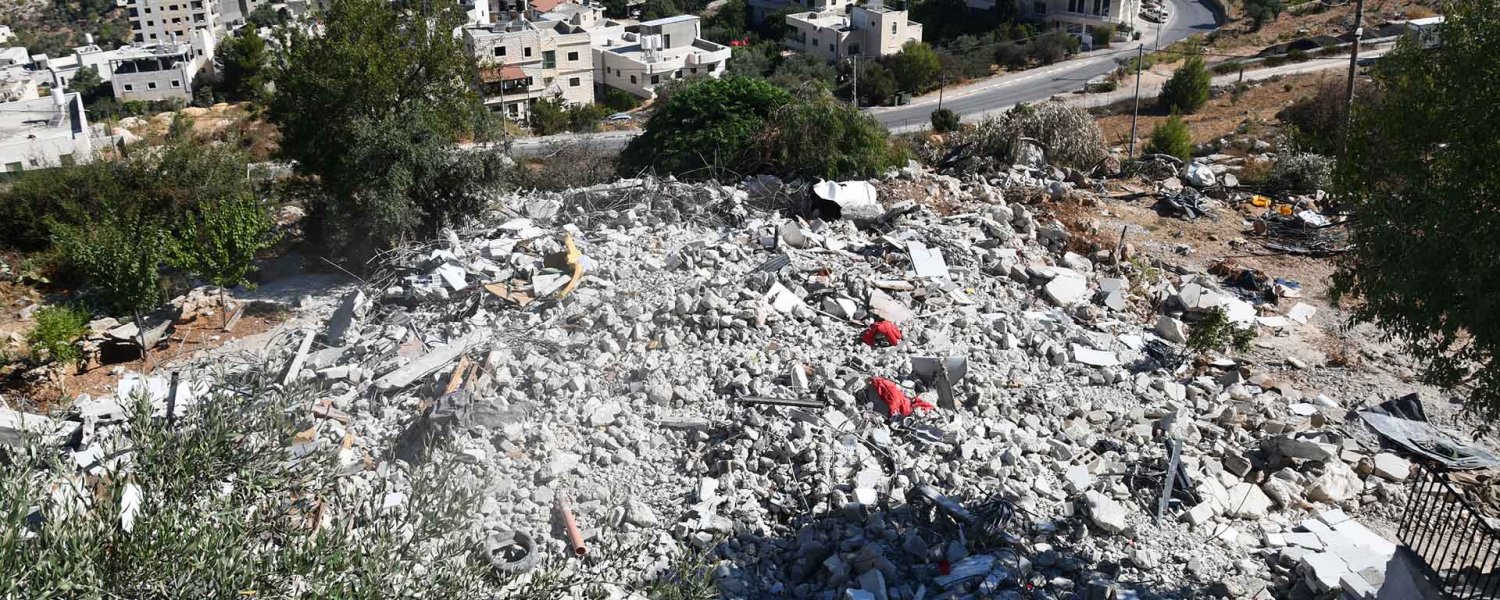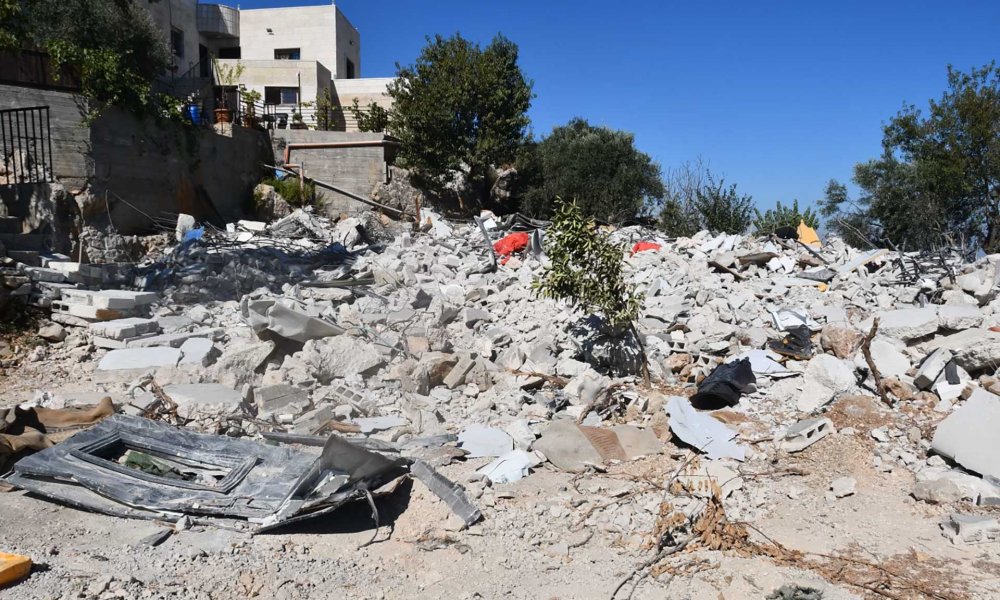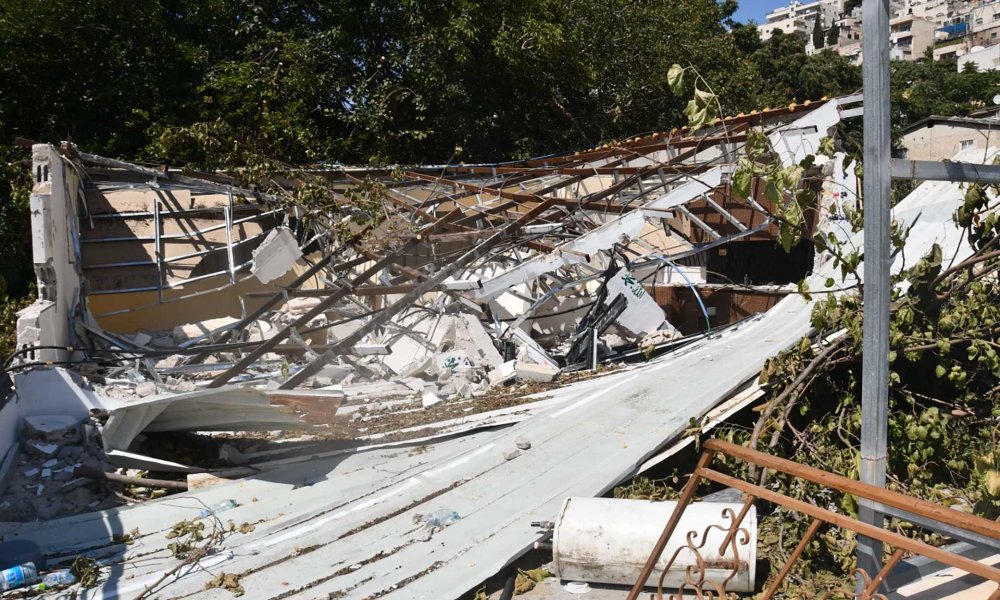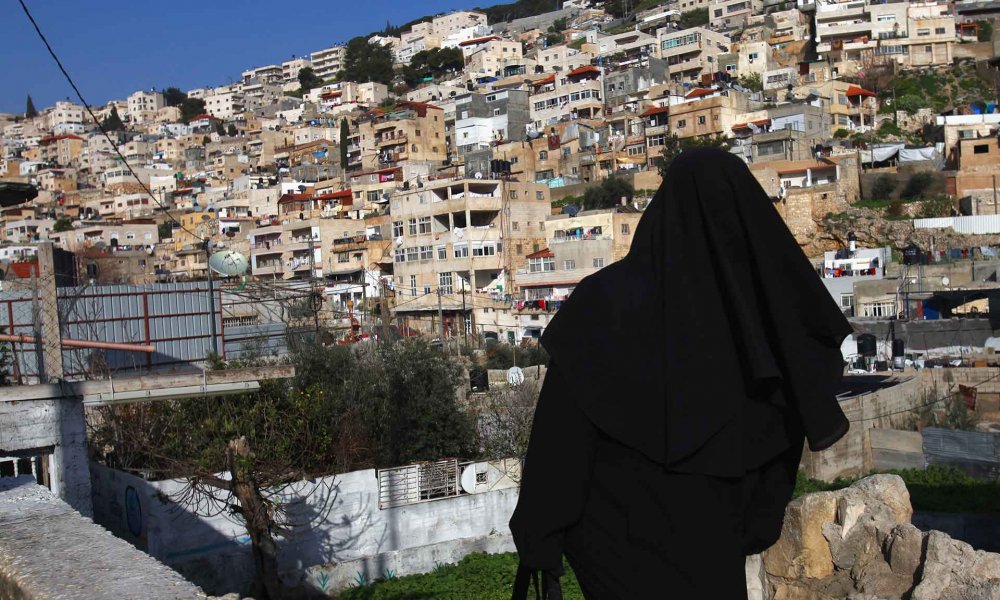Home Demolitions in al-Walaja

Credit:
Jessica Buxbaum for Jerusalem Story
Home Demolitions Spike in East Jerusalem as Ongoing War Averts Attention
Israeli soldiers awakened Mahmoud Rabah around 9:00 a.m. on July 22, 2024. They had arrived to demolish his home in the Palestinian village of al-Walaja, which straddles Jerusalem’s southern edge both within Israeli municipal boundaries and in Area C of the rest of the West Bank.
“The soldiers said they had an order to demolish the house,” Mahmoud told Jerusalem Story.1 “They said it was on my door, but I didn’t see any order.” Mahmoud said the army refused to show him the demolition order.
Laborers with the Israeli military began removing furniture and other belongings from the homes of Mahmoud and his brother, Mustafa, whose family lived in another unit of the same house.
The Rabah family of 122 then watched as bulldozers turned their simple dwelling into a pile of rubble.
Al-Walaja’s northern section is part of Israel’s municipal East Jerusalem, while its southern part falls within the Israeli military-controlled Area C of the rest of the West Bank. The Rabah home is located in the latter part. Their home destruction is the first demolition to occur in Area C of al-Walaja in years, setting a dangerous precedent, according to Jerusalem-focused nonprofit Ir Amim.
“While the reason behind the Civil Administration’s decision to carry out the demolition is unknown, it could indicate a major change in policy which would place dozens of homes in Area C of al-Walaja under threat of demolition,” Ir Amim reported.3 “The recent demolition in Area C is alarming and could be a portent of mass demolition in this part of the village.”4
The Rabah brothers built their homes on the family’s land in 2013, directly below their parents’ house. Unlike their parents, who received a permit to build their home decades ago, long before the Separation Wall existed, Mahmoud and Mustafa were prevented from obtaining a permit because Israel has banned construction next to the wall, which encircles al-Walaja on three sides and has separated the residents from much of their their verdant agricultural lands. Israel began building the wall in 2002; the Rabah family’s land is located next to the wall with the Jewish settlement of Har Gilo on the opposite side. Despite its proximity to the wall, Har Gilo has been permitted to expand.5
With the help of lawyers, over the years, the Rabah family tried to legalize their home. Their attorney filed a request to the Israeli army in April 2024 for an exception to the military order prohibiting construction next to the wall. The request is still pending, yet the home was demolished before a reply was even received.6
Home Demolitions Skyrocketing amid War
At the time of writing, 18 homes have been demolished in al-Walaja in 2024, with 16 of them destroyed in the East Jerusalem section of the village.7
“Before the war, the authorities would be present once a month, twice a month at a maximum to come and check [for] any new structures,” al-Walaja resident Hassan Abu Tin told Jerusalem Story.8 “Since the incidents of the war, they are present every single week.”
Israel occupied al-Walaja’s northern end in 1967 when it occupied East Jerusalem and tripled its area (see Where Is Jerusalem? The Uncertain and Unfixed Boundaries of the City). Since then, the Jerusalem municipality has been recalcitrant about approving zoning plans, which permit residential construction for East Jerusalem. Without such plans, residents can’t obtain building permits. Therefore, the municipality considers more than 130 homes in al-Walaja illegal and subject to demolition.9 In response to a lack of municipal planning, al-Walaja residents developed their own zoning plan for their village.
The residents appealed to Israel’s Supreme Court in 2017 after the municipality failed to review their zoning plan.10 The Supreme Court then imposed a demolition freeze for 38 homes in al-Walaja, which has been continuously renewed since 2018.
Six homes, which received demolition notices in 2020, weren’t included in this demolition freeze, despite being built in the same area as the 38 homes. The homes were given demolition orders in 2016. This is due to Israel’s Kaminitz Law, a 2017 amendment to Israel’s Building and Planning Law, which allows the municipality to issue demolition orders without first making a request to court. In this regard, structures built after 2016 can be immediately demolished without court intervention.11
A City-Wide Trend
Al-Walaja, however, isn’t the only Palestinian area in East Jerusalem experiencing an increase in home demolitions since Israel declared war on Gaza on October 7, 2023.
According to data from Ir Amim,12 Israel has demolished more than 220 structures in East Jerusalem generally since the Gaza war began, with 160 of those being residential units.13
From January 1 to August 8, 2024, the rate of home demolitions in East Jerusalem increased by 75 percent over the rate of the same period in 2023.14
Seventeen homes were demolished the week before and after the International Court of Justice ruled Israel’s occupation of the West Bank (including East Jerusalem) to be illegal on July 19, 2024,15 which Amy Cohen, Ir Amim’s international relations director, said is particularly noteworthy.
“This [Israeli] government has flouted all accountability that the international community is trying to demand from them. And so, it’s a little bit like a middle finger or a slap in the face to the international community,” Amy told Jerusalem Story.
While demolitions have spiked across East Jerusalem, Amy said that al-Walaja and al-Bustan, part of the East Jerusalem neighborhood of Silwan, have experienced the highest concentration of demolition orders in the recent month.
Sweeping Residents Out for a “King’s Garden”
Al-Bustan, home to 1,500 Palestinian residents who live in about 150 houses,16 is under threat of widescale demolition because the Jerusalem municipality wants to build an archaeological park atop the neighborhood’s ruins. The municipality alleges that al-Bustan is where the Jewish King David established his kingdom around 1000 BCE, and thus, the area should be cleared of Palestinians and transformed into a national park called the “King’s Garden.”
On August 5, 2024, Israeli authorities demolished al-Bustan resident Muhammad Abed Odeh’s home,17 which is the second floor of his in-laws’ house, displacing him, his wife, and their five children. Over the last month alone, the municipality and Israel Border Police have delivered 16 demolition orders for homes in al-Bustan, affecting more than 120 people.18
While facing demolition threats since 2005, until now, al-Bustan has been largely spared thanks to an extended demolition freeze that residents secured due to international pressure and their own efforts negotiating with the municipality to develop a zoning plan for the neighborhood.
Yet the municipality has consistently rejected the residents’ proposed plans and instead put forward their own proposal, which still requires homes to be demolished.19
Jahalin Solidarity,20 a Palestinian nonprofit fighting against forcible displacement, emphasized in a July 2024 press release that the most recent spate of demolition notices comes without any discussions or meetings on zoning plans. “Just bulldozers,” the statement read.
Muhammad told Jerusalem Story that urban planning discussions between the al-Bustan neighborhood committee and the municipality stopped around October 7, 2023.21
“They changed the way they treat us,” Muhammad said.
The recent spike in demolitions can be attributed to the July 24, 2024, Israeli parliament decision to transfer the National Enforcement Unit (which carries out demolitions) from the finance ministry to the national security ministry led by far-right lawmaker Itamar Ben-Gvir. Activist groups warn that demolitions may become even more frequent under Ben-Gvir’s authority, especially since he’s vowed to ramp up the demolition of Palestinian homes.22
“With the transfer of these powers, we could ultimately see major acceleration in more demolitions in Jerusalem,” Amy said.
This policy change, however, is only one part of the issue. Muhammad revealed that when Israeli soldiers and the Jerusalem municipality came to demolish his home, they said to him, “After October 7, we have zero patience with you guys.”
“I told him, ‘We lived with you for 70 years,’” Muhammad said. “‘Why are you talking to me like this? You’re talking to me like we are terrorists. We are neighbors.’”
Muhammad’s concerns didn’t seem to matter to the soldiers.
Notes
Mahmoud Rabah, interview by the author, July 30, 2024. All subsequent quotes from Rabah are from this interview.
“First Home Demolition in Years in Area C of al-Walaja Could Signal Dangerous New Trend,” Ir Amim, July 25, 2024.
“First Home Demolition.”
“First Home Demolition.”
“First Home Demolition.”
“First Home Demolition.”
“First Home Demolition.”
Hassan Abu Tin, interview by the author, February 12, 2024. All subsequent quotes from Abu Tin are from this interview.
“End of Year Push—A Glimmer of Hope in Walaja,” Ir Amim, December 26, 2023.
Jessica Buxbaum, “Jerusalem’s Last Agricultural Village Fights for Survival,” Mondoweiss, April 1, 2022.
Jahalin Solidarity, “Amid the Destruction of Gaza, West Bank Home Demolitions Spiral,” news release, January 29, 2024.
Amy Cohen, interview by the author, July 28, 2024. All subsequent quotes from Cohen are from this interview.
“Numerous Homes in Al Bustan, Silwan under Imminent Threat of Demolition,” Ir Amim, August 8, 2024.
“Numerous Homes in Al Bustan.”
“Israel’s Continued Occupation of Palestinian Territory ‘Unlawful’: UN World Court,” United Nations, July 19, 2024.
“Numerous Homes in Al Bustan.”
“Numerous Homes in Al Bustan.”
Jahalin Solidarity, “Urgent Bustan Media Notice,” news release, August 6, 2024.
“Numerous Homes in Al Bustan.”
Jahalin Solidarity, “Amid Gaza Destruction, Silwan’s Bustan Home Demolition Threat Spirals,” news release, July 19, 2024.
Muhammad Abed Odeh, interview by the author, August 7, 2024. All subsequent quotes from Abed Odeh are from this interview.
“Numerous Homes in Al Bustan.”




